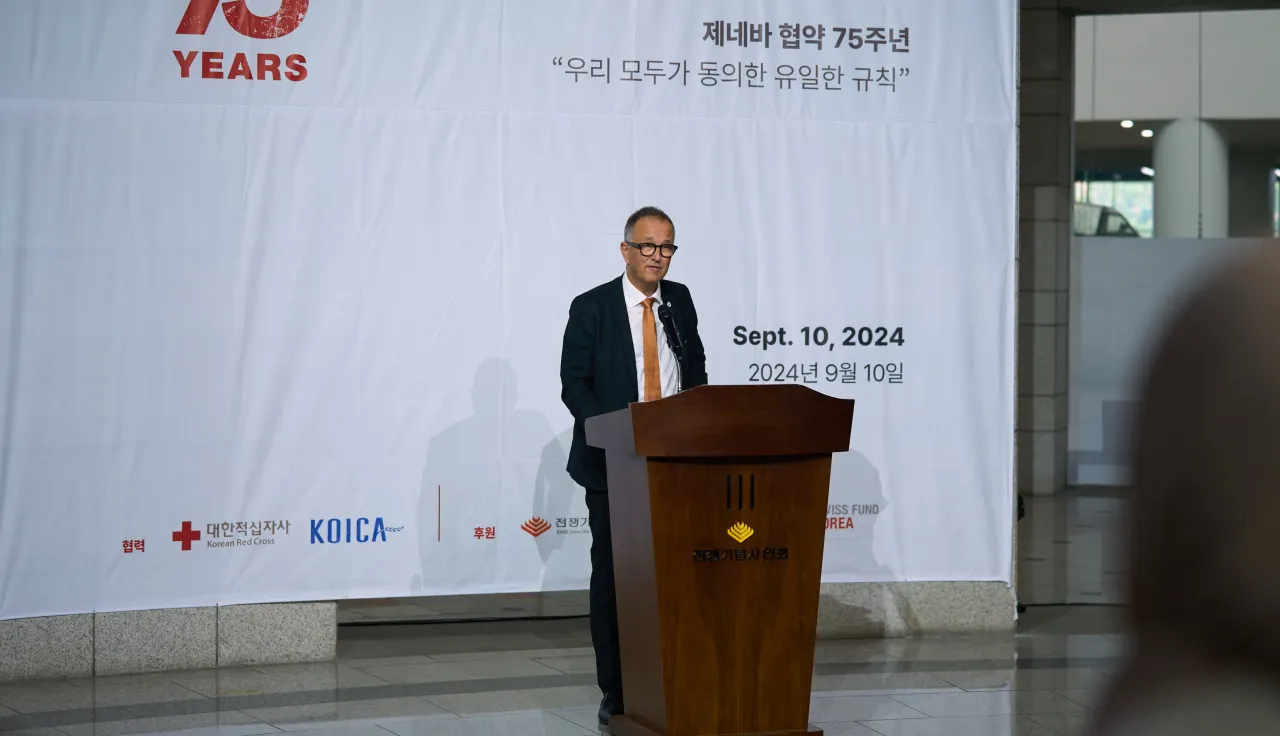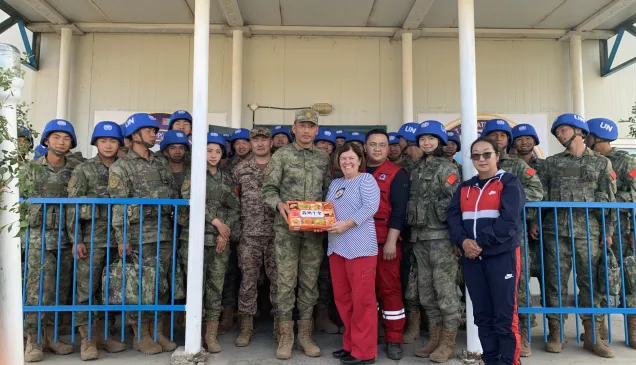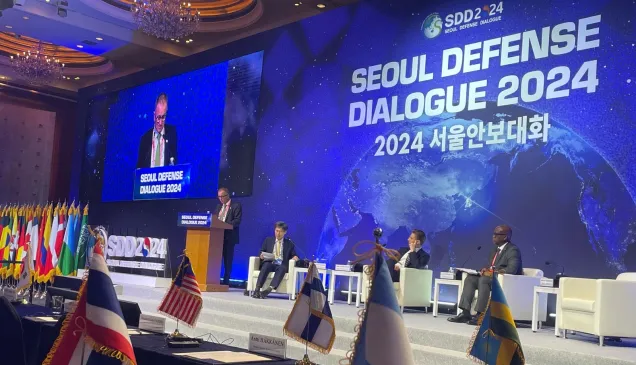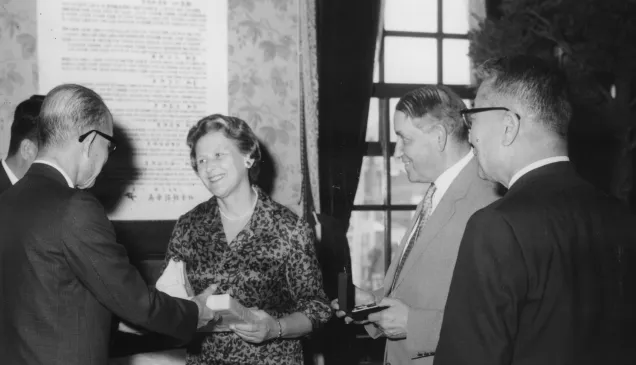Republic of Korea: Preserving humanity in war by upholding the Geneva Conventions

Speech of Balthasar Staehelin, Head of the ICRC Regional Delegation for East Asia, at the Commemoration Ceremony of the 75th Anniversary of the Geneva Conventions, War Memorial of Korea, Seoul, Republic of Korea, 10th September 2024.
Mr Markus Mäder, State Secretary for Security Policy of Switzerland,
H.E. Dagmar Schmidt Tartagli, Ambassador of Switzerland to the Republic of Korea,
Mr Seung Joo Baek, President of the Korean War-memorial Organization,
Dr Chul Soo Kim, President of the Republic of Korea National Red Cross (KNRC),
Ms Jungmee Sohn, Vice President of the Korea International Cooperation Agency (KOICA),
Excellencies, Ladies and Gentlemen,
I thank the Ministry of Foreign Affairs of the Republic of Korea, the Embassy of Switzerland to the Republic of Korea, the Korea International Cooperation Agency, the Republic of Korea National Red Cross, and the Korean War Memorial Organization for making today's ceremony possible.
We mark in 2024 the 75th anniversary of the four Geneva Conventions. They are foundational treaties of international humanitarian law that exist to prevent some of armed conflicts’ worst consequences and to preserve humanity.
International humanitarian law aims to protect persons who are not, or are no longer, taking part in hostilities, and to limit the means and methods of warfare, thereby saving lives and reducing suffering.
Today, we must reaffirm our unwavering commitment to continue working for the respect of the Geneva Conventions, especially given what we see in armed conflicts around the world:
The fact is that the Geneva Conventions are under strain. We witness a harrowing litany of violations—children, women and men killed indiscriminately, hospitals and schools reduced to rubble, detainees and prisoners of war subjected to inhumane treatment, horrifying numbers of women and girls subjected to sexual violence, humanitarian workers deliberately targeted and humanitarian efforts intentionally obstructed. The Geneva Conventions and international humanitarian law prohibit all this.
In an increasingly polarized world, the Geneva Conventions stand as a collective agreement that even wars have limits. Every State has committed to these fundamental rules. Yet, despite this universal endorsement, noncompliance is rampant. When adherence is claimed, overly permissive interpretations of international humanitarian law dilute its effectiveness.
Ladies and Gentlemen,
The place where we gather today – the War Memorial of Korea – is not only a symbol of the brutal Korean War that took millions of lives in a span of just three years, but also a heartfelt reminder of the lasting toll of conflict. Even after the fighting ends, families too often carry with them the heartbreak of conflict, as they struggle to determine the fate of their missing relatives or live in anguish separated from loved ones. This place also embodies the importance of never giving up on finding political solutions and striving for peace.
The number of armed conflicts has surged in recent decades – more than 120 are recorded by the ICRC today. The ICRC is currently responding to the humanitarian fallout in more than 90 countries across the globe.
Every day we see images and footages showing horrific toll of war on civilians in Gaza and Ukraine. There are many other places where civilians have to live such scenes, but we may not hear about them. For example, in Myanmar, the decades of conflict have torn apart families, with an estimated 3.3 million people forcibly displaced from their homes. Continuous fighting is leaving wounded and sick struggling to get adequate healthcare, leaving countless children malnourished amid fields sown with mines instead of seeds, and young adults without any hopeful future in sight.
Rising tensions on the Korean Peninsula are deeply troubling. In fact today's gathering is a reminder that whether in this region or in Ukraine, Gaza, Sudan, or Myanmar, political leaders must carve out space for dialogue and de-escalation.
Amid the rising conflicts and the spectre of accelerated warfare, the Geneva Conventions remain a powerful tool for mitigating the human cost of conflict. There is no other universal set of norms that preserves humanity during armed conflict.
The Geneva Conventions save lives. But full implementation requires political will. Therefore, the ICRC’s call to action is clear:
- Parties to armed conflict must renew their commitment to the Geneva Conventions, adhering to both the letter and the spirit of the law.
- States must ratify and uphold IHL treaties, particularly the additional protocols to the Geneva Conventions.
- We must see tangible humanitarian improvements in conflict-affected areas to reduce suffering.
- Finally, States must ensure that new technologies of warfare—AI, cyber operations, information warfare—strictly comply with IHL, and we must develop new limits on autonomous weapons systems. Without new legal constraints, autonomous weapons may operate with little oversight, making life-and-death decisions without human intervention. Our morals and values should not regress as technological advances progress.
As I speak, Seoul is hosting representatives of more than 120 states at a RE-AIM conference to deliberate the use of AI in the military domain. The ICRC is actively participating in these discussions to ensure that humanitarian consequences of the use of AI in armed conflicts is understood and factored into policymaking.
The ICRC, together with our Red Cross & Red Crescent Movement partners, will continue striving for the respect of international humanitarian law and to play our role as a neutral humanitarian intermediary between the warring parties.
As we look to the future, we must ensure robust adherence to the Geneva Conventions. Any other path is a betrayal of the commitment made on August 12, 1949.
Thank you.



